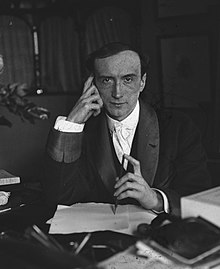Henry Bataille | |
|---|---|
 Henry Bataille 1911 | |
| Born | Félix-Henri Bataille 4 April 1872 |
| Died | 2 March 1922 (aged 49) |
| Known for | French dramatist, poet. |
Félix-Henri "Henry" Bataille (4 April 1872, in Nîmes – 2 March 1922, in Rueil-Malmaison[1]) was a French dramatist and poet. His works were popular between 1900 and the start of World War I.
Bataille's parents died when he was young.[2] He attended the École des Beaux-Arts and Académie Julian[3] to study painting, but started writing when he was 14. Henry wrote plays and poems, but after the success of his second play, La Lépreuse, he became a playwright exclusively. Bataille's early works explored the effects of passion on human motivation and how stifling the social conventions of the times could be. For example, Maman Colibri, is about a middle-aged woman's affair with a younger man. Later, Bataille would gravitate towards the theatre of ideas and social drama.
Bataille was also a theorist of subconscious motivation. While he did not use his theories in most of his own works, he influenced later playwrights such as Jean-Jacques Bernard and the "school of silence".
- ^ "HENRY BATAILLE : French Dramatist Dead". The Sun. No. 3539. Sydney. 4 March 1922. p. 1. Retrieved 20 August 2017 – via National Library of Australia.
- ^ "Henry Bataille", Encyclopædia Britannica Online
- ^ (fr)La Rampe : revue des théâtres, music-halls, concerts, cinématographes, 1922